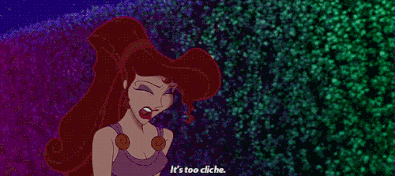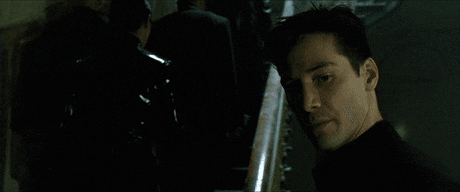
There is a general idea that cliches, when they surface in the narrative of a story, be it movie, tv or webcomics or anything else, is a sign of bad writing.
There is of course a good basis for this presumption, because usually a cliche is a plot device, or a plot sequence or development that has been done so many times in more or less the same way that it gives audiences deja vu. 
It implies that the author isn't investing anything new and isn't trying to tell a story but rather frankenstein together pieces of other stories that look cool, to make some kind of patchwork that passes for a piece of work for people to consume.
HOWEVER.
Is it really the cliche's fault?
There's a reason why cliche's are cliches: They are narratively appealing nuggets of story, they are simply popular.
And they are appealing because they work.
They work in that they have the potential to emotionally engage the audience, to create pathos, to allow for catharsis or to set a certain mood.
But they will only work if they are incorporated in a story, not grafted or shoehorned into it because of a checklist of things to include or because it was cool in that other movie, novel or show.
There's a saying that there's no such thing as an original story, just original spins on the same tale. And it's possible that were we to strip each story down to the bare essentials, we would end up with a very finite number of formulas.
We would end up with cliches.
So that's the thing with cliches. It's not the cliches that are the problem, it's the way they're used. Like most things in life, really.
Don’t forget you can now advertise on DrunkDuck for just $2 in whichever ad spot you like! The money goes straight into running the site. Want to know more? Click this link here! Or, if you want to help us keep the lights on you can sponsor us on Patreon. Every bit helps us!
Special thanks to our patrons!!

Justnopoint - Banes - Rmccool - Abt Nihil - Phoenixignis - Gunwallace - Cdmalcolm1 - Cresc - Pauleberhardt - Scruff - Dragonaur - Emma Clare - Dylandrawsdraws - Functioncreep - The D Wrek - Mks Monsters - Eustacheus - Dillycomics - Barrycorbett - Sinjinsoku - Smkinoshita - Jerrie - Chickfighter

The Thing With Clichés
Tantz_Aerine at 12:00AM, June 8, 2019
5 likes!


©2011 WOWIO, Inc. All Rights Reserved Mastodon





Ironscarf at 5:45PM, June 9, 2019
Visual cliches are also an essential part of comics language. Maybe that's another a story for another day!
Avart at 12:34PM, June 8, 2019
Cliches needs to feel natural and flow within the plot. If you force its use, I think you're in trouble. I use them a lot, even without noticing. The girl in danger saved by the hero, feeling observed and there's nobody watching you... And a bunch more that I can't remember right now.
bravo1102 at 9:19AM, June 8, 2019
Throw the cliches into a pot, bring it to a boil, add characters and situations. Stir. Add spices and that's where you twist the cliches all out of shape with a brand new taste. If you go back to the turn of the 20th century and follow various story genres you'd be surprised at discovering that the most hoary awful cliche was once a bright, new, fresh twist. And it's a facepalm and you go, "that's where that came from."
KAM at 5:39AM, June 8, 2019
They can be fun to play with. Set it up so the reader can't help but think of a cliche, then take a left turn, or tweak it a bit so it's not quite the cliche they expected.
usedbooks at 4:54AM, June 8, 2019
Cliche = trope = plot device. It's a tool in the writer's toolbox. It can be used lazily as a shortcut or expertly to take advantage of the readers' experiences, the known and nostalgic, quite similar to the use of archtypal characters to help orient readers in a way they are comfortable with.
PaulEberhardt at 3:35AM, June 8, 2019
The human brain always creates all kinds of shortcuts to see its owner through the day without sending the needle into the red too often. Even if you wanted to, you couldn't erase each and every cliché from your work, because readers will just subconsciously try and project them into your story anyway. If this fails too often, it'll send said readers into WTF-mode, which means that 1% of them will declare your work avant-garde and the rest will just forget about it. As you and ozoneocean said, the trick is to stay conscious about clichés and use them purposefully. It all boils down to judging the right amount and a good grasp of (comic) timing, then they can be a powerful storytelling tool. Else, it'd be like ...hm... trying to hang up a picture by walking around blindfolded with a running hammer drill in the hope that there is at least one wall among the things you hit with the tip - only much, much less exciting. Same goes for these cool WTF-moments when you subvert a cliché.
Ozoneocean at 12:40AM, June 8, 2019
Clichés can be good shortcuts to get meaning and story aspects across quickly without expanding on it... they're like compressed, prefabricated modules that you plug in, tropes are much the same. But the problem is that most creators have seen them and seen that they work but don't really understand WHY and HOW they work so they just plug them in anywhere and don't bother modifying them too much to fit. To use clichés and tropes well you have to tailor them to the needs of YOUR story and you have to know where they properly go and why you need them, just don't add them because you think they're cool: like a moron who sticks oversized spoilers all over their car - spoilers have a legitimate use but if you have no understanding of that they'll just be terrible.